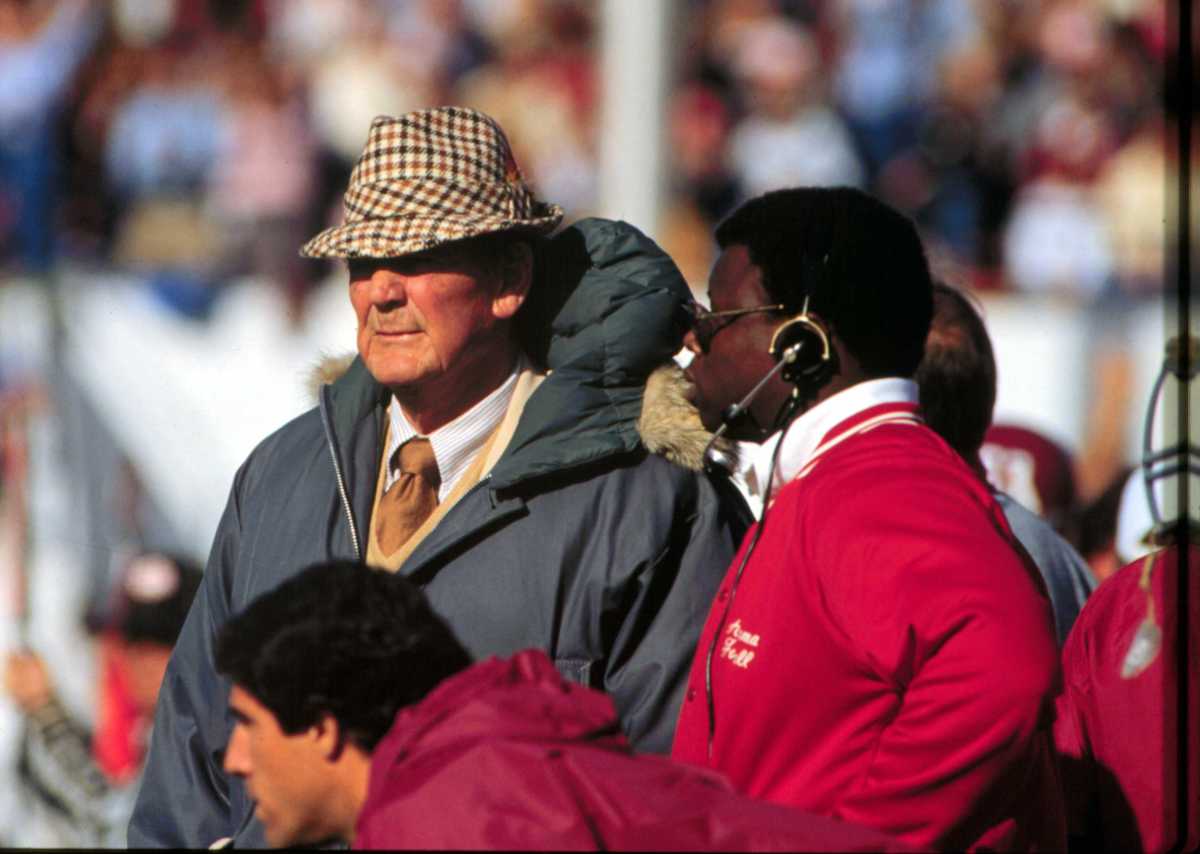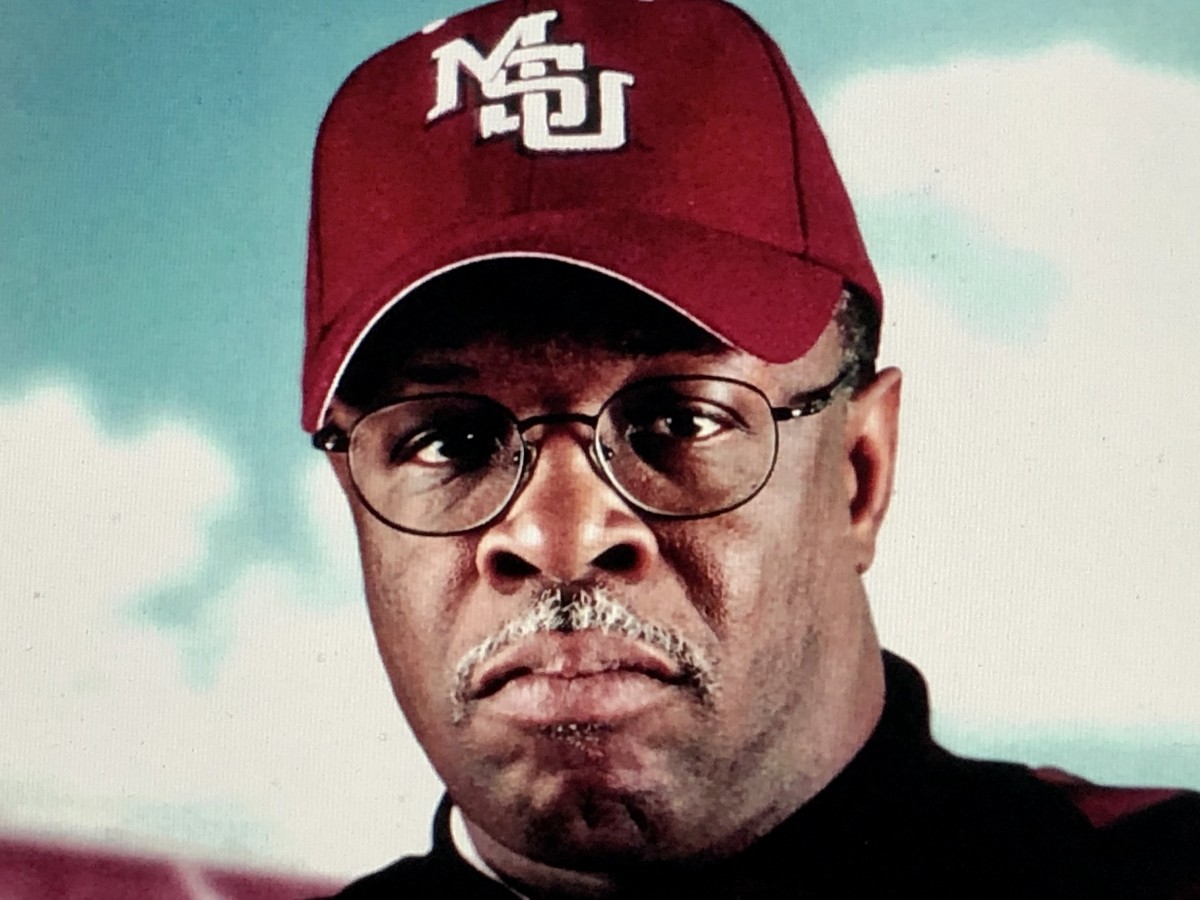Wendell Hudson Said it Best About Sylvester Croom Going into the ASHOF: "Long Overdue"
The words seemed obvious, but they still meant a lot coming from the person who spoke them.
Wendell Hudson has waited nearly 20 years to see his friend Sylvester Croom join him in the Alabama Sports Hall of Fame. Saturday evening it's finally going to happen.
"Long overdue," Hudson said.
He wasn't referring to the fact that the 52nd annual induction ceremony was initially scheduled for May 2. Due to the coronavirus pandemic it was postponed and rescheduled, and will still be a virtual, online-only event.
But Croom knows a few things about being patient.
Also being enshrined are Ronnie Brown, Doug Kennedy, Q.V. Lowe, Woody McCorvery, Jorge Posada, Duane Reboul and Steve Shaw.
Additionally, Robbie Robertson will be honored as the 2020 Distinguished American Sportsman; Paul Finebaum will receive the 2020 Mel Allen Media Award; Don Hawkins is due to get the 2020 Frank “Pig” House Award; and Brodie Croyle will receive the inaugural Starr-Sullivan Achievement Award.
All have been outstanding in their respective sports and fields.
However, the night should belong to Croom. That's not disrespect to any of the others, but more reflective of his respected status.
"The type of person he is, great guy, and has always been that way, and what he's done both playing and coaching, all the things he's done in football, long overdue," Hudson said.
"That's the kind of person you want to have in the Alabama Sports Hall of Fame."

Just a few months ago, when collegiate sports were still being played, Croom was saying some similar things about Hudson (ASHOF Class of 2001). On the 50th anniversary of his becoming the first Black athlete to receive a scholarship to Alabama, Hudson was honored with having the first jersey at Alabama retired.
Croom participated in the festivities along with some other prominent Black figures in Alabama athletics like Leon Douglas and former Crimson Tide track coach Harvey Glance (both from the ASHOF Class of 1996).
"It meant so much," Hudson said about them and the numerous former teammates who made the trip. "It meant that there was so much more to it than the sports you play. There was a relationship that we all had with each other, and it was a good relationship."
Croom didn't speak during the “Tribute to a Trailblazer” luncheon, or during the halftime ceremony when the jersey was raised to the rafters a Coleman Coliseum. Instead, he took part in a special video tribute.
“There’s nobody who understands, because he’s the first,” Croom said.
Yeah, Croom definitely knows what that's like, too.
Even if you know his story, it's worth repeating, especially during a time when race is again at the forefront of the national psyche.
The Tuscaloosa product was one of the first black football players at Alabama, and as a senior captain was named an All-American in addition to winning the Jacobs Trophy as the Southeastern Conference’s best blocker. Before playing center, he was a linebacker, tight end and tackle.
During his three seasons, Croom helped lead Alabama to a 22-2 record, three straight SEC titles, and the 1973 national championship.
“In my career, I’ve been around a lot of great leaders,” Ozzie Newsome said of Croom, “And he led that huddle, trust me. He was impressive at a lot of things, but mostly as a leader.”
He then became a coaching icon.
Croom was an assistant at Alabama for 11 seasons under Paul W. "Bear" Bryant and Ray Perkins, and then spent 17 years in the NFL before finally getting the chance to be a head coach.
In 2003, Croom became the first Black head football coach in SEC history. He inherited a Mississippi State program that had been struggling, and was coming off three straight seasons in which the Bulldogs failed to notch more than three wins.
At the end of his fourth season he was named the 2007 SEC Coach of the Year.

When the late Mike Slive announced that he would step down as conference commissioner in 2015, he mentioned Croom's hiring as one of the proudest moments of his tenure. He also called it his greatest accomplishment.
“Before his hiring, my goal was to create a national conference," Slive said. "We were a bit regional. As long as we had shown we couldn't provide opportunity for everyone, we wouldn't be the kind of national league that I wanted us to be. With the hiring of Sylvester, it was a huge story, especially out of the state of Mississippi. That allowed us to become that national conference that we wanted to become.”
Noting the magnitude of the moment, Sports Illustrated sent Pulitzer Prize winner Rick Bragg to Starkville to try and not only capture the moment and somehow put it into perspective. Of course, he more than succeeded.
The headline began with the words "Long time coming." It wrapped up with a quote from Croom: "Things do change."
ASHOF Class of 2020
RONNIE BROWN – Football | Born December 12, 1981 in Rome, Ga. He played running back at Auburn University from 2000-2004. He finished seventh in school history in rushing yards and fifth in rushing touchdowns. He was the 2003 Citrus Bowl MVP. Drafted second overall by the Miami Dolphins in the 2005 NFL Draft, he started at running back the first four weeks of the season. In the 2008 season, he had 916 yards and ten touchdowns, leading to his Pro Bowl selection. In 2010, he started all 16 games with the Dolphins. He played six seasons with Miami and went on to play with the Philadelphia Eagles, San Diego Chargers and Houston Texans. He retired in 2014 with the Chargers.
SYLVESTER CROOM – Football/coaching | Born September 25, 1954 in Tuscaloosa, Ala. Croom played center from 1972-1974 at the University of Alabama. During his college career he was awarded the Jacobs Blocking Trophy and also earned All-American honors. Croom helped the Crimson Tide win three SEC championships and the National Championship in 1973. He played one year in the NFL for the New Orleans Saints before returning to Tuscaloosa to coach. Croom was an assistant at Alabama for 11 seasons under Coach Paul Bryant and Coach Ray Perkins. He then spent 17 years coaching in the NFL. In 2004, he was named Head Coach at Mississippi State University, making him the first African-American head football coach in the Southeastern Conference. For the 2007 season, Croom was voted SEC Coach of the Year. After Croom’s time at Mississippi State, he served as running backs coach in the NFL for the Rams, Jaguars, and Titans.
DOUG KENNEDY – Paralympian | Born November 13, 1958 in Haleyville, Ala. He is a Paralympic athlete that holds many world records. In 1991, at the age of 33, Kennedy dominated as the top wheelchair racer in the U.S. He was the world record holder for the 1500m, the 10K, the 15K, and the 5-mile. He was a gold medalist in the 1990 Goodwill Games in the 1500m. He was on the 1988 and 1992 U.S. Paralympic Teams. His career began in 1987 when he won the silver medal in the Stoke-Mandeville Games in Albany, England in the pentathlon. He went on to win two gold medals for the U.S. National Pentathlon team in 1987 and 1988. Kennedy’s career was unmatched in 1990 as he was considered the greatest wheelchair racer in the world. He was given the Sington Award as the Physically Challenged Athlete of the Year for the State of Alabama.
Q.V. LOWE – Baseball | Born January 15, 1945 in Red Level, Ala. He played at both Gulf Coast Community College and Auburn University. As a pitcher at Auburn, he went 23-3 with a winning percentage of .885 in two years. He set an Auburn record at that time of a career ERA of 1.69 and most complete games in one season (10). During his senior season he went 15-1 and helped lead Auburn to the 1967 College World Series. After his playing career, he was a coach and manager in the minor leagues for the Chicago Cubs, New York Yankees and Montreal Expos farm teams. In 1986 he established the baseball program at Auburn University-Montgomery. He won 1,127 games at AUM, and led them to the NAIA World Series three times, finishing second in 1990. His teams won six conference championships and he was named NAIA Coach of the Year in 1990. In 2007, he was named Alabama Baseball Coaches Association College Coach of the Year; the Auburn Walk of Fame in 1998; and the Alabama Coaches Hall of Fame in 2005.
WOODY MCCORVEY – Football/coaching | Born September 30, 1950 in Grove Hill, Ala. He played quarterback at Alabama State from 1968-1971. After starting in the high school ranks, he began his collegiate coaching career in 1978 with NC Central. He has held positions at the University of Alabama, Alabama A&M, Clemson, Mississippi State, South Carolina, and Tennessee. During his 26 plus years in college football, McCorvey has been a part of five national championship teams and 31 bowl games. Since 2008, he has been an Associate AD for Football Administration at Clemson under Coach Dabo Swinney.
JORGE POSADA – Baseball | Born August 17, 1971 in Santurce, Puerto Rico. He played collegiately at Calhoun Community College in Decatur, Ala., where he was selected as co-captain and named to the All-Conference Team in 1991. He was drafted in the 24 Round of the 1990 Major League Baseball Draft by the New York Yankees. He played 17 seasons, all with the Yankees. He was a five-time American League All-Star. He was also a five-time Silver Slugger Award Winner. The Yankees won four World Series during his career. He is only the fifth Major League catcher with at least 1,500 hits, 350 doubles, 275 home runs, and 1,000 RBIs in a career. From 2000 to 2011, he compiled more RBIs and home runs than any other catcher in baseball. He is the only Major League catcher to ever bat .330 or better with 40 doubles, 20 home runs, and 90 RBIs in a single season.
DUANE REBOUL – Basketball/coaching | Born November 9, 1948 in New Orleans, La. He was the basketball coach at Birmingham-Southern College for 17 years and became the winningest coach in school history with 402 wins. He led the Panthers to two NAIA National Championships (1990 and 1995), six conference championships and nine tournament appearances. His team had twelve 20-win seasons and averaged 23.6 wins per year. In BSC’s first full year of eligibility in NCAA Division I basketball they were co-champions of the Big South Conference (2004). He was named Coach of the Year in the Big South Conference twice. His Panthers had a 44-game winning streak that spanned two seasons (1995 and 1996). In the 1998 season they won their first 20 games.
STEVE SHAW – Football/officiating | Born June 11, 1959 in Tuscaloosa, Ala. He began his officiating career after his graduation from the University of Alabama. He worked high school football for 14 seasons with the Birmingham Football Officials Association. His first role as a collegiate official was with the Gulf South Conference where he officiated for six years. Following his time with the GSC, he served as a referee in the Southeastern Conference for 15 years. He was selected for 14 post-season assignments, including two National Championship Games, eight BCS Bowls, and four SEC Championship Games. Shaw was President of the SEC Football Officials Association from 2009-2011. He was named Coordinator of Football Officials for the SEC in 2011. He has received numerous officiating awards including the Rush Lester Silver Dollar Award and the Bobby Gaston – Ed Dudley Spirit of Officiating Award.
